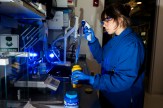Northeastern University Receives $100,000 Grand Challenges Exploration Grant for Innovative Global Health Research by Professor Kim Lewis
Northeastern University announced today that it has received a $100,000 Grand Challenges Explorations grant from the Bill & Melinda Gates Foundation. The grant will support an innovative global health research project conducted by Kim Lewis, director of the Antimicrobial Discovery Center, titled “”Targeted Capture of Latent M. Tuberculosis Cells from a Mammalian Host.”
Professor Lewis’ project is one of 104 grants announced by the Gates Foundation for the first funding round of Grand Challenges Explorations, an initiative to help scientists around the world explore bold, new solutions for health challenges in developing countries. The grants were provided to all levels of scientists in 22 countries and five continents.
To receive funding, Professor Lewis showed in a two-page application how his idea falls outside current scientific paradigms and could lead to significant advances in global health if successful.
Dr. Lewis’ research proposes a straightforward method to make latent M. tuberculosis cells stand out from the rest of the population, which will enable their observation, capture and study.
Most individuals infected with M. tuberculosis (MTB) carry a latent form of the pathogen that is asymptomatic and highly resistant to treatment, with 10% of those infected going on to develop acute, transmissible disease. Latent MTB have never actually been observed or isolated, in spite of substantial effort directed at the problem. Latent cells are apparently dormant and sparse, and without any known activity associated with these cells, it is not obvious how to identify them.
“Latent tuberculosis is the main reservoir of infection and presents enormous health problems on a global scale due to insufficient methods to detect and treat asymptomatic carriers,” said Lewis. “The research we do at the Center will result in approaches to detect, for the first time, latent MTB cells. We are pleased of the recognition from the Bill & Melinda Gates Foundation and will take full advantage of this opportunity to advance to the next stage of research which will guide the development of effective therapeutics against latent tuberculosis.”
“I congratulate each individual who took the initiative to share their idea with us to help fight the world’s most serious diseases,” said Dr. Tachi Yamada, president of the Gates Foundation’s Global Health Program. “The number of creative approaches we received exceeded our highest aspirations. Projects from this initial pool of grants have the potential to transform health in developing countries, and I will be rooting for their success.”
The Antimicrobial Discovery Center at Northeastern University is an academic research center working at the cutting edge of modern molecular microbiology and biotechnology. With established programs in antibiotic resistance and drug discovery, the Center has been making paradigm-shifting advances in a field that has seen few discoveries since the last broad-spectrum class was introduced in the early 1960s.
Led by Professor Lewis, recent breakthroughs from the Center have included the culture of new species of bacteria for antibiotic discovery, achieved by designing a diffusion chamber for growing “unculturable” organisms. This work is a collaborative effort with Professor Slava Epstein from Biology Department. Since fully 99% of microbial species in the environment have never been successfully grown in the laboratory, this represents an important milestone for providing access to a previously untapped source of new antibiotics.
The Center is also at the forefront of research into a new type of bacterial cells called persisters. In seemingly intractable diseases such as tuberculosis, persister cells can lie dormant in human organs for decades, invulnerable to known antibiotics, and then rapidly resuscitate. Research in the Center, including the development of a new technology to kill persister cells, is laying the ground for development of anti-TB drugs capable of eradicating these latent cells and drastically reducing the length of treatment.
For more information, please contact Renata Nyul at 617-373-7424 or at r.nyul@neu.edu.
About Grand Challenges Explorations
Grand Challenges Explorations is a five-year $100 million initiative of the Gates Foundation to promote innovation in global health. The program uses an agile, streamlined grant process – applications are limited to two pages, and preliminary data are not required. Proposals are reviewed and selected by a committee of foundation staff and external experts, and grant decisions are made within approximately three months of the close of the funding round.
Applications for the second round of Grand Challenges Explorations are being accepted through November 2, 2008, and topics for the third round will be announced in early 2009. Grant application instructions, including the list of topic areas in which proposals are currently being accepted, are available at www.gcgh.org/explorations.
About Northeastern
Founded in 1898, Northeastern University is a private research university located in the heart of Boston. Northeastern is a leader in interdisciplinary research, urban engagement, and the integration of classroom learning with real-world experience. The university’s distinctive cooperative education program, where students alternate semesters of full-time study with semesters of paid work in fields relevant to their professional interests and major, is one of the largest and most innovative in the world. The University offers a comprehensive range of undergraduate and graduate programs leading to degrees through the doctorate in six undergraduate colleges, eight graduate schools, and two part-time divisions. For more information, please visit www.northeastern.edu.





